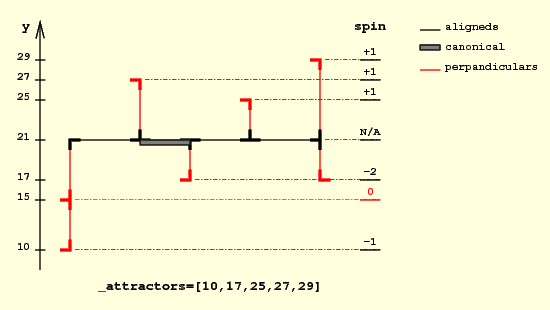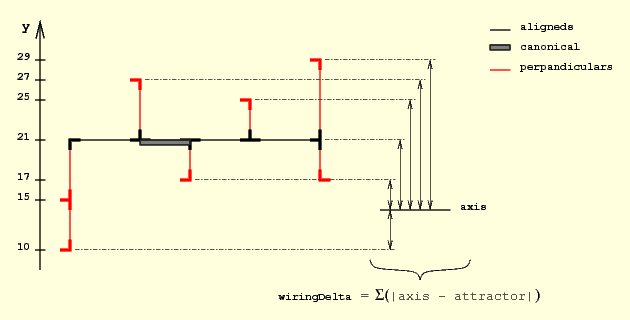Algorimthmic datas associated the TrackSegment. More...
Public Types | |
| enum | SlackState { RipupPerpandiculars = 1, Minimize = 2, Dogleg = 3, Slacken = 4, ConflictSolveByHistory = 5, ConflictSolveByPlaceds = 6, LocalVsGlobal = 7, MoveUp = 8, MaximumSlack = 9, Unimplemented =10, Repair =11 } |
Public Member Functions | |
| bool | hasRoutingEvent () const |
| RoutingEvent * | getRoutingEvent () const |
| TrackElement * | getTrackSegment () const |
| Track * | getTrack () const |
| DbU::Unit | getLeftMinExtend () const |
| DbU::Unit | getRightMinExtend () const |
| unsigned int | getTerminals () const |
| Net * | getNet () const |
| unsigned int | getState () const |
| unsigned int | getStateCount () const |
| unsigned int | getRipupCount () const |
| unsigned int | getStateAndRipupCount () const |
| DbU::Unit | getWiringDelta (DbU::Unit axis) const |
| const Interval & | getPerpandicularFree () const |
| void | setState (unsigned int, unsigned int flags=0) |
| void | setRoutingEvent (RoutingEvent *) |
| void | setRipupCount (unsigned int) |
| void | incRipupCount () |
| void | decRipupCount () |
| void | resetRipupCount () |
| void | resetStateCount () |
| void | update () |
Detailed Description
Algorimthmic datas associated the TrackSegment.
The DataNegociate object contains all the informations the negociation algorithm needs to know about a TrackSegment. Those informations mostly describe the slackening and ripup state of that segment.
State related datas:
- The ripup count in the current state. The count is reset to zero at each state transition.
- The slackening state (see DataNegociate::SlackState). The state indicate the next topological modification to be applied on the segment should the ripup count reach it's maximal value.
- The associated RoutingEvent. If no RoutingEvent is present, it means the segment has been either successufully placed or the algorithm has given up trying to. If present, it is a pending request for placement.
Topological related datas:
leftMinExtend, the potential minimal position of the segment left extension. May not be reachable due to other topological constraints.rightMinExtend, the potential minimal position of the segment right extension.terminals, the number of terminals attached to this segment.attractors, a table of coordinates of the end points of the perpandiculars to this segment. Used to compute the wiring delta if we move the axis of the segment.perpandiculars, avectorof the perpandicular TrackElement. This is a fast-access cache. It must be updated each time the topology of the net is modificated.perpandicularFree, the free interval defined by the perpandiculars, that is for the sgement axis.
Perpandiculars, Free, Attractors & Wiring Delta
All those informations are computed and updated by the DataNegociate::update() method, which relies on:
- AutoSegment::getTopologicalInfos()
- AutoSegment::getTerminalCount()
They must be reviewed as they do not take advantage of the new AutoSegment structuration.
For every perpandicular set of AutoSegment to the TrackSegment we want to place, get the coordinates of the extremity not connected to the segment and put that coordinate into a table associated with it's spin. The spin tells if the extremity is attracting the segment up or down (for an horizontal segment). The spin is incremented for up and decremented for down. After all the extremities have been processeds, we took into account only the coordinates with a non-zero spin, which means they truly attract the segment (whatever the direction).

The wiring delta is the total wire length needed to connect from the attractors to the segment, should it be placed on axis.

Modifications History
Main changes in DataNegociate class design:
- Merge in the separate class
Cost. - Suppress the
SlackState::Desalignate, due to the simplificated structure of the AutoSegment/AutoContacts (no more collapseds, or forced alignements).
Member Enumeration Documentation
◆ SlackState
| enum SlackState |
Describe the various stages of a TrackSegment slackening. The numerical values are choosen so we can increment them as a counter.
| Enumerator | |
|---|---|
| RipupPerpandiculars | Force perpandiculars to be riped up as well as the TrackSegment, then schedule the placement of the TrackSegment before it's perpandiculars. |
| Minimize | If the TrackSegment is made of multiple TrackSegments with a forced alignement, suppress the alignement constraint. This should be deprecated now. Try to displace the perpandiculars so the TrackSegment is reduced to it's minimal length. |
| Dogleg | Break the segment into two smaller ones. |
| Slacken | Create additional wiring so threre is no more contraints transmitted by the perpandiculars or the terminal contacts. |
| ConflictSolveByHistory | Try to solve a conflict between a set of global segments by analysing the event/ripup history. See SegmentFsm::conflictSolveByHistory(). |
| ConflictSolveByPlaceds | Try to solve a conflict between a set of global segments by analysing the current track context. See SegmentFsm::conflictSolveByPlaceds(). |
| LocalVsGlobal | To be reviewed. |
| MoveUp | The segment is to be moved up (if possible). |
| MaximumSlack | The final state, topological modifications are exhausteds, if it cannot place at this point, it never will. |
| Unimplemented | Used only during the development stage, telling that the state is not available yet. |
| Repair | The router is in repair mode. |
Member Function Documentation
◆ hasRoutingEvent()
|
inline |
Returns: true if there is a pending RoutingEvent for this TrackSegment.
Referenced by NegociateWindow::addRoutingEvent(), and TrackSegment::reschedule().
◆ getRoutingEvent()
|
inline |
Returns: The pending RoutingEvent. NULL will be returned if there is no pending event, meaning that the segment has been placed.
Referenced by SegmentAction::doAction(), Manipulator::makeDogleg(), Manipulator::relax(), TrackSegment::reschedule(), RoutingEvent::reschedule(), and TrackSegment::swapTrack().
◆ getTrackSegment()
|
inline |
Returns: The associated TrackSegment.
◆ getTrack()
|
inline |
Returns: A proxy accessor for the segment's track.
◆ getLeftMinExtend()
|
inline |
Returns: The minimum extend possible of the segment's source (left) ending. Computed by DataNegociate::update().
Referenced by Manipulator::insertInTrack().
◆ getRightMinExtend()
|
inline |
Returns: The minimum extend possible of the segment's target (right) ending. Computed by DataNegociate::update().
Referenced by Manipulator::insertInTrack().
◆ getTerminals()
|
inline |
Returns: The number of terminal to which this segment is connected Computed by DataNegociate::update().
Must be refined: direct or indirect?.
◆ getNet()
|
inline |
Returns: A cached accessor to the segment's net (for faster access).
◆ getState()
|
inline |
Returns: The current state (see DataNegociate::SlackState).
Referenced by RoutingEvent::getState(), Manipulator::insertInTrack(), and Manipulator::ripupPerpandiculars().
◆ getStateCount()
|
inline |
Returns: The number of times we have reached the ripup limit while in this stage.
Referenced by SegmentFsm::conflictSolveByPlaceds().
◆ getRipupCount()
|
inline |
Returns: The number of times the segment has been riped up in this stage.
Referenced by Manipulator::canRipup(), SegmentAction::doAction(), and RoutingEvent::process().
◆ getStateAndRipupCount()
|
inline |
- Returns
- A composite number combining the state and the ripup count:
(state<<4)+ripup.
◆ getWiringDelta()
Returns: The wiring length needed to connect to the attractors if the segment is put on axis. The lower, the better...
◆ getPerpandicularFree()
|
inline |
Returns: The range of legal positions generated only by the perpandiculars.
◆ setState()
|
inline |
Set or reset the slacking state (see SlackState). If the state is the same as the current one, the state count is incremented. If the new state changes or flags contain KtReset, the state count is reset to one.
Referenced by SegmentAction::doAction(), Manipulator::relax(), Manipulator::repackPerpandiculars(), RoutingEvent::reschedule(), Manipulator::ripupPerpandiculars(), and RoutingEvent::setState().
◆ setRoutingEvent()
|
inline |
Associate event to this TrackSegment.
Referenced by RoutingEvent::reschedule(), and RoutingEvent::setSegment().
◆ setRipupCount()
|
inline |
Directly sets the ripup count to count.
Referenced by SegmentAction::doAction().
◆ incRipupCount()
|
inline |
Increment the ripup count. No check is performed for bound limit.
◆ decRipupCount()
|
inline |
Decrement the ripup count (will never go below zero).
◆ resetRipupCount()
|
inline |
Reset the ripup count to zero.
Referenced by SegmentAction::doAction().
◆ resetStateCount()
|
inline |
Reset the state count to zero.
◆ update()
| void update | ( | ) |
Recompute leftMinExtend, righMinExtend, number of terminals and attractors positions.
- Remark: The constructor do not calls it. It is to the algorithm responsability
- to call it before using the computed datas.
Referenced by NegociateWindow::setGCells().
The documentation for this class was generated from the following files:
- DataNegociate.h
- DataNegociate.cpp
- DataNegociate.dox